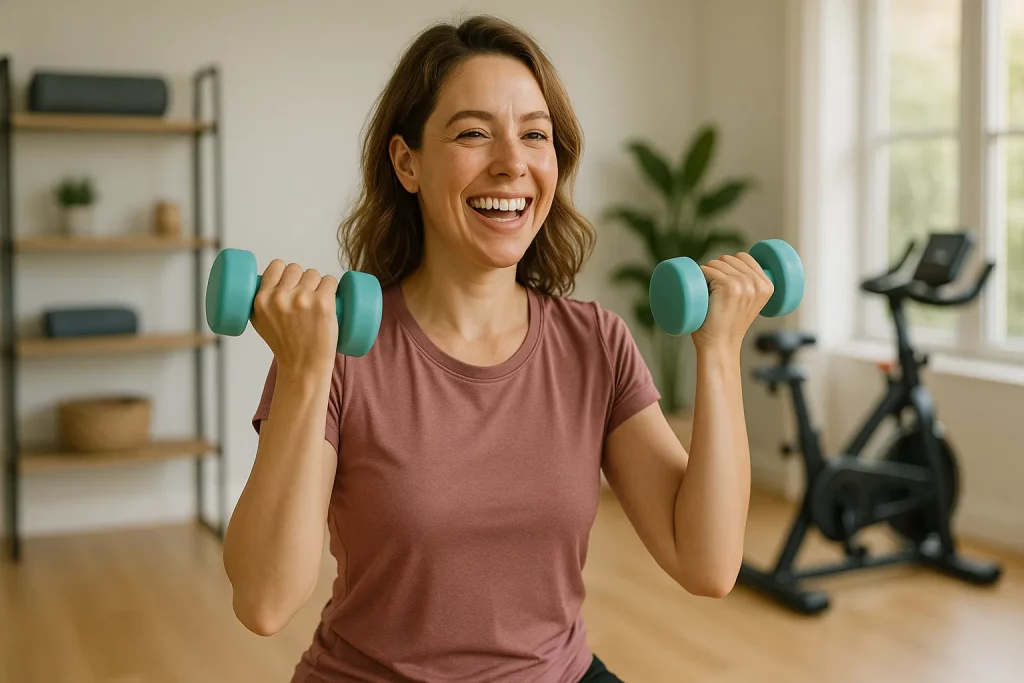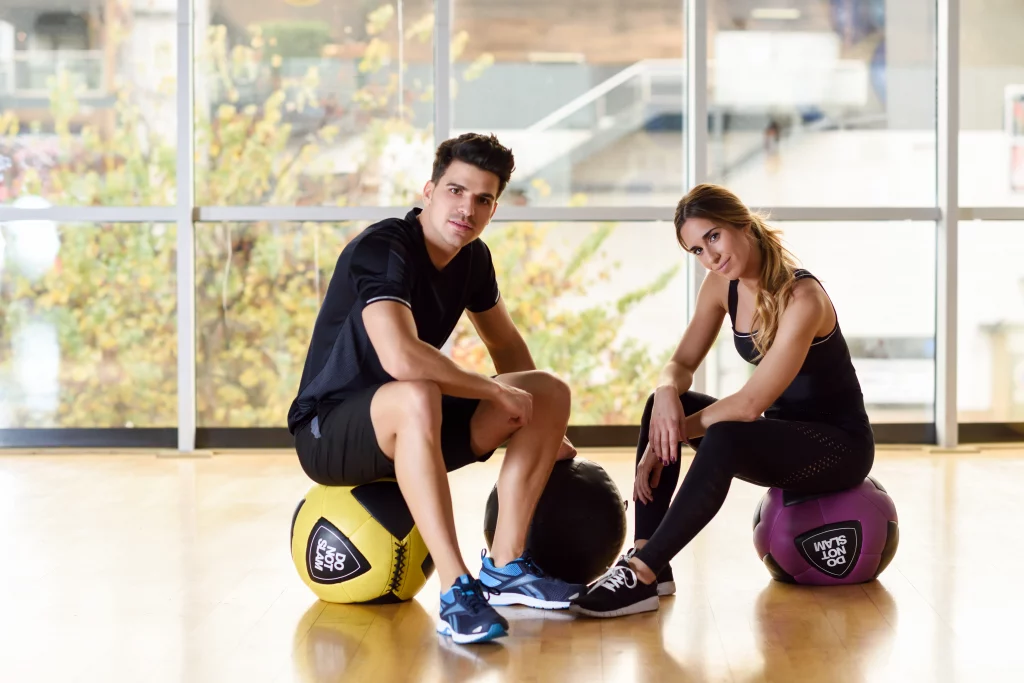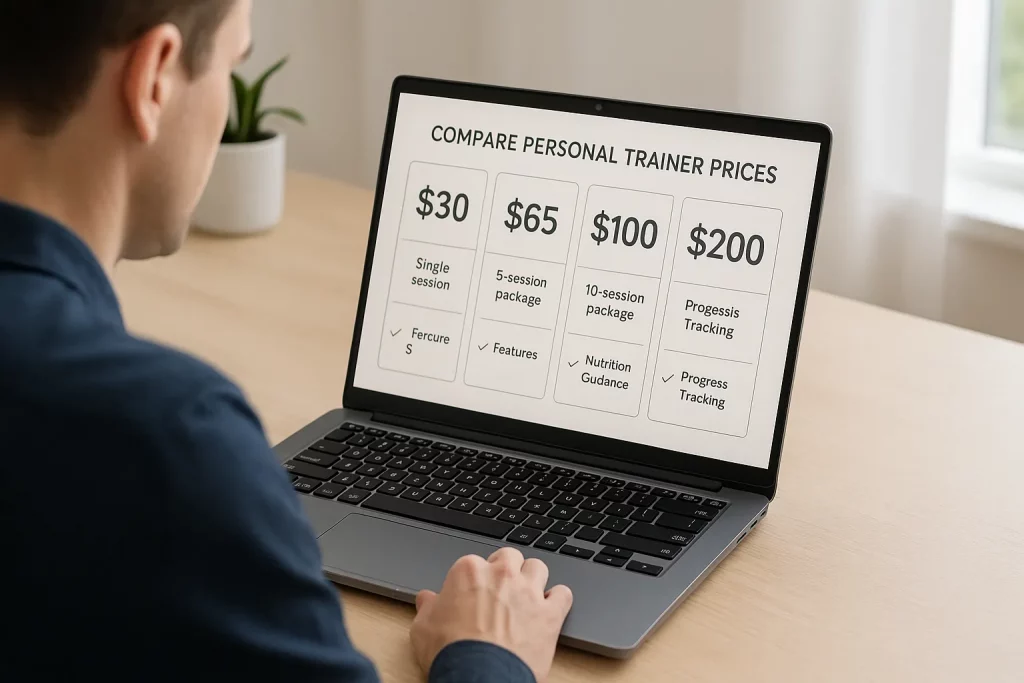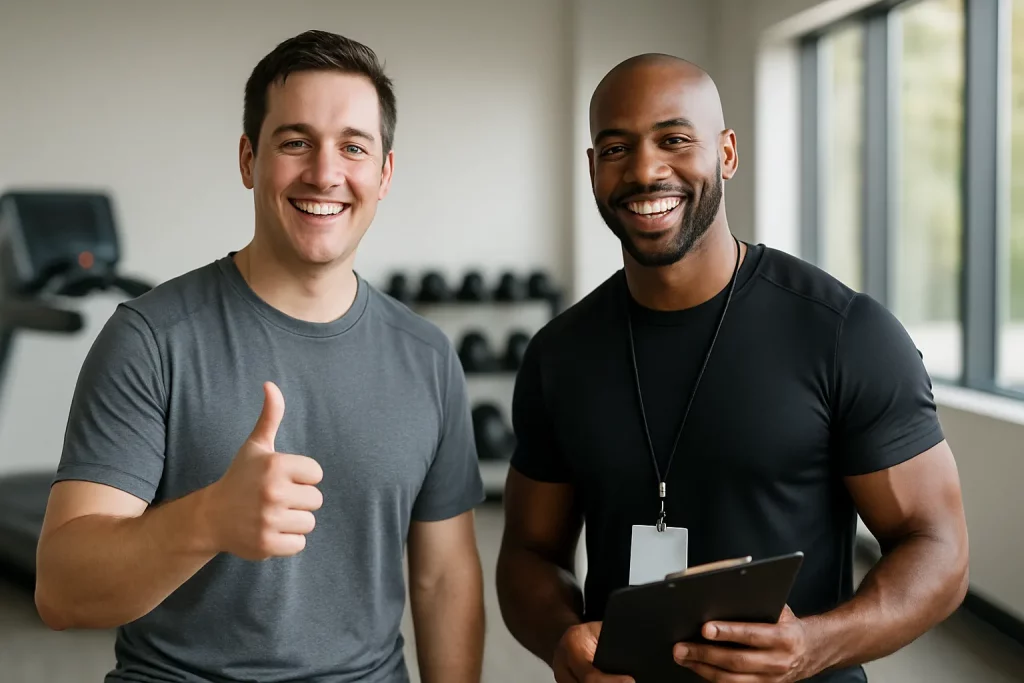Trying to find a personal trainer who actually gets you? You’re not alone. Having the right coach can be the difference between just going through workouts and finally seeing results that last. The tricky part is that not every trainer will fit your goals or your style. Some focus on weight loss, others on strength, and some work entirely online. So how do you know which one is the best match for you?
In this guide, we’ll walk you through the process of setting clear goals, understanding your training preferences, learning about different trainer types, and asking the right questions before you decide. By the time you finish reading, you’ll know exactly how to find a personal trainer who fits your needs and keeps you motivated.

Step 1: Define Your Fitness Objectives
Before you even think about how to find a good personal trainer, get clear on your goals. Do you want to lose weight, build muscle, run your first 10K, or just feel healthier in daily life? If you’re not sure what you’re aiming for, it’s easy to get distracted, and even the best trainer won’t be able to guide you properly.
Clear goals matter because they give your workouts purpose and make it easier for a trainer to build a plan that truly fits you. Whether your focus is weight loss, strength, endurance, or just feeling more confident, the more specific you are, the faster you’ll see progress.
Use SMART Goals to Stay on Track
A lot of people struggle with setting clear goals, so don’t worry if it feels tricky. The easiest way is to use the SMART method. That means your goal should be Specific, Measurable, Achievable, Relevant, and Time-bound.
For example, instead of saying “I want to get fit,” try this: “I want to lose 10 pounds in the next 3 months by working out four times a week and tracking my progress.”
That’s clear, realistic, and gives both you and your trainer something solid to work with.

Step 2: Find What Keeps You Motivated
Finding the right fitness trainer is not only about your goals. It is also about what makes you feel comfortable and motivated. Do you enjoy high-energy workouts like HIIT, or do you prefer a calmer approach focused on strength and form? Would you do better with a trainer who is loud and encouraging or one who is patient and methodical? And don’t forget the setting. Some people love the gym, others prefer training at home or working with an online coach.
The best way to find a personal trainer you will actually stick with is to be honest about what you enjoy. Think back to your past workout experiences. What kept you excited? What made you quit? Share those things when you talk to potential trainers. It will save you time and help you find the perfect match.
Working with the right coach also brings many additional advantages, from accountability to faster progress. For a deeper dive, explore our full guide on the benefits of personal training.

Step 3: Find the Right Type of Trainer
After you set your goals and think about your preferences, the next step is learning about the different types of trainers. Not every coach is the same. Each one has their own strengths and focus areas. Knowing these differences will make it much easier to find a fitness trainer who fits your specific needs.
Main Types of Personal Trainers
Here are the main types of trainers you might come across:
- Strength Coaches: Perfect if you want to build muscle, lift heavier, or boost athletic performance
- Weight Loss Specialists: Best for anyone focused on fat loss. They usually mix tough workouts with basic nutrition guidance to help you drop weight safely.
- Sports Trainers: Ideal if you play a sport and want to improve skills like speed, agility, or coordination.
- Rehabilitation Trainers: Great if you are coming back from an injury or surgery. They know how to keep things safe while helping you regain strength.
- General Fitness Trainers: A solid choice if you just want to move better, stay active, and keep a balanced routine.
Generalist vs. Specialist Trainers
One thing you will face when figuring out how to find the right personal trainer is whether to go with a generalist or a specialist.
- Generalist trainers are flexible. They can guide you in many areas, which makes them a good choice if you are new to fitness or just want a balanced routine. The downside is that they may not have deep knowledge in one specific area.
- Specialist trainers focus on one main goal. If you want to lose weight, improve sports performance, or recover from an injury, they bring the detailed expertise you need. The catch is that they might not give you as broad a program if you are looking for an all-around approach.
Online vs. In-Person Trainers
These days, you have more choices than ever when it comes to training. You can find a personal trainer near you and work face to face, or you can hire an online coach and train from anywhere. Each option has its own benefits and downsides.
- Online trainers are flexible. You can pick from a wider range of coaches, book sessions around your schedule, and often save money. Many platforms even give you apps and tracking tools so you can follow your progress at home. The drawback is that you miss the hands-on corrections and real-time push that comes with a trainer standing next to you.
- In-person trainers give you that direct feedback and accountability. If you are someone who learns best with a coach right there adjusting your form, this can be the best fit. On the flip side, in-person training usually costs more, and you are limited to the trainers available in your area.
Curious about online coaching? Check out our guide on How Does Online Personal Training Work.

Step 4: Research Potential Trainers
Once you know your goals and the type of coach you want, it is time to start looking. This step matters because you want to find a fitness trainer who not only understands your fitness needs but also clicks with your personality and style.
Best Places to Start Your Search
You have a lot of options when it comes to looking for a trainer. The key is to choose the path that feels easiest and most natural for you. Here are some of the best ways to find a fitness trainer and get started:
1. Online Platforms and Apps
One of the most popular ways today is using online platforms. They let you browse trainer profiles, see reviews, and sometimes even book sessions directly. The best way to find a personal trainer online is to filter by your goals, check out what other clients say, and make sure their availability matches your schedule. You can start by exploring trainers on Happy Trainers, where you’ll find certified coaches with different specialties and price ranges.
2. Local Gyms and Fitness Centers
If you prefer face-to-face training, your local gym is a great place to start. Most gyms have trainers on staff, and many offer free consultations. Watch how trainers work with their clients, ask the front desk for recommendations, and find out if someone specializes in your fitness goals.
3. Word of Mouth
Always remember the power of recommendations. Ask your friends, coworkers, or family if they know a trainer they like. Personal referrals are one of the easiest ways to make sure you are working with someone reliable.
4. Social Media
These days, many trainers promote their work on Instagram, TikTok, or LinkedIn. You can see their style, hear from their clients, and even message them directly. Just remember to look past the polished posts and make sure they have real credentials and experience.
Key Things to Check
Before you decide on a coach, check their background. Finding a personal trainer who is really worth your time means looking at both their certifications and their real experience. That way, you know they can actually guide you toward your goals.
Research also shows that supervised training with a certified personal trainer is more effective than unsupervised exercise, improving both physical outcomes and long-term adherence.
Checking Certifications, Experience, and Expertise
When you are trying to find a fitness trainer, do not just look at the price or the closest option. A good coach should have both the right certifications and the real-world experience to back them up.
Here are the main things to check:
- Certifications: Look for respected ones like NASM, ACE, ISSA, or NSCA. These prove the trainer has met professional standards.
- Experience: Ask how long they have been working with clients and if they have handled goals similar to yours. A trainer who has helped someone recover from an injury is better suited if you are in the same situation.
- Expertise: Choose a trainer who focuses on your main goal, whether that is weight loss, strength training, sports performance, or rehabilitation.
The best trainer for you is the one who combines education, proven experience, and expertise that matches your goals.
Questions to Ask a Potential Personal Trainer
Before you commit, have a quick chat or consultation with the trainer. A trial session is often the best way to see if you’re a good match. If you’d like to know what that usually involves, check out our guide on what happens in the first personal training session.
Here are some simple questions that help you know if they are the right fit:
- Can you share your certifications and relevant experience with clients like me?
- How would you describe your training style?
- How will we track progress, and how often will we review it?
- What does your pricing include, and what does it exclude?
- What days and times are you available, and how do you handle cancellations?
- Do you offer online or hybrid coaching if I need flexibility?
- Can you share a client success story similar to my situation?
- How do you adjust plans if I hit a plateau or deal with an injury?
- Do you offer a trial session so I can experience your coaching?
Red flags: vague answers, promising quick results, pushing supplements, or pressure for long contracts.

Step 5: Understanding Personal Trainer Costs
Cost is one of the biggest factors people consider when choosing a trainer. Prices can vary widely depending on experience, location, session length, and whether the training is online or in person. A highly certified trainer with years of experience will usually charge more than someone just starting out, and sessions in large cities often cost more than in smaller towns.
Always look beyond the hourly rate and check what the trainer includes. Some trainers offer nutrition guidance, progress tracking, or hybrid coaching options, while others keep it simple with just the workout sessions. Knowing what you’re paying for helps you compare trainers more fairly.
If you want a deeper look at pricing and what really affects it, check out our detailed guide on personal trainer cost and determining factors.
Step 6: Make Your Final Decision
After research and trial sessions, compare your top choices side by side. Use a simple table like this to make the final call:
| Factor | Trainer A | Trainer B | Trainer C |
| Certifications | NASM, ACE | ISSA | NSCA |
| Experience | 5 years, weight loss | 8 years, athletes | 3 years, beginners |
| Training Style | High energy, HIIT | Calm, strength, focus | Balanced approach |
| Availability | Evenings, weekends | Mornings only | Flexible schedule |
| Price / Packages | $60 per session | $70 per session | $50 per session |
| Personal Fit | Motivating, friendly | Detail-oriented | Easygoing |
Once you compare these factors side by side, it’s usually clear which trainer fits your needs best.
Get the Most Out of Your Training
Choosing your trainer is just the beginning. To get the best results, focus on these three things:
- Set clear expectations: Talk through your goals, schedule, and how you will measure progress together.
- Build the relationship: Stay honest, give feedback, and keep communication open.
- Track your progress: Use apps like Apple Fitness+ or WHOOP. Take photos, write down milestones, and celebrate small wins along the way.

Final Thoughts
Finding a personal trainer isn’t just about hiring someone to guide your workouts. It’s about choosing a coach who understands your needs, matches your style, and keeps you motivated for the long run.
In fact, a 2024 randomized trial found that clients working with a personal trainer achieved greater fat loss, strength gains, and better adherence to their exercise program compared to those training solo or with a partner.
So, do your research, ask the right questions, and compare your options carefully. When you find a fitness trainer who feels like the best fit, you’ll not only see better results but also enjoy the journey more and stay consistent with your fitness goals.
💬 What about you? Have you ever worked with a personal trainer? Share your experience in the comments
